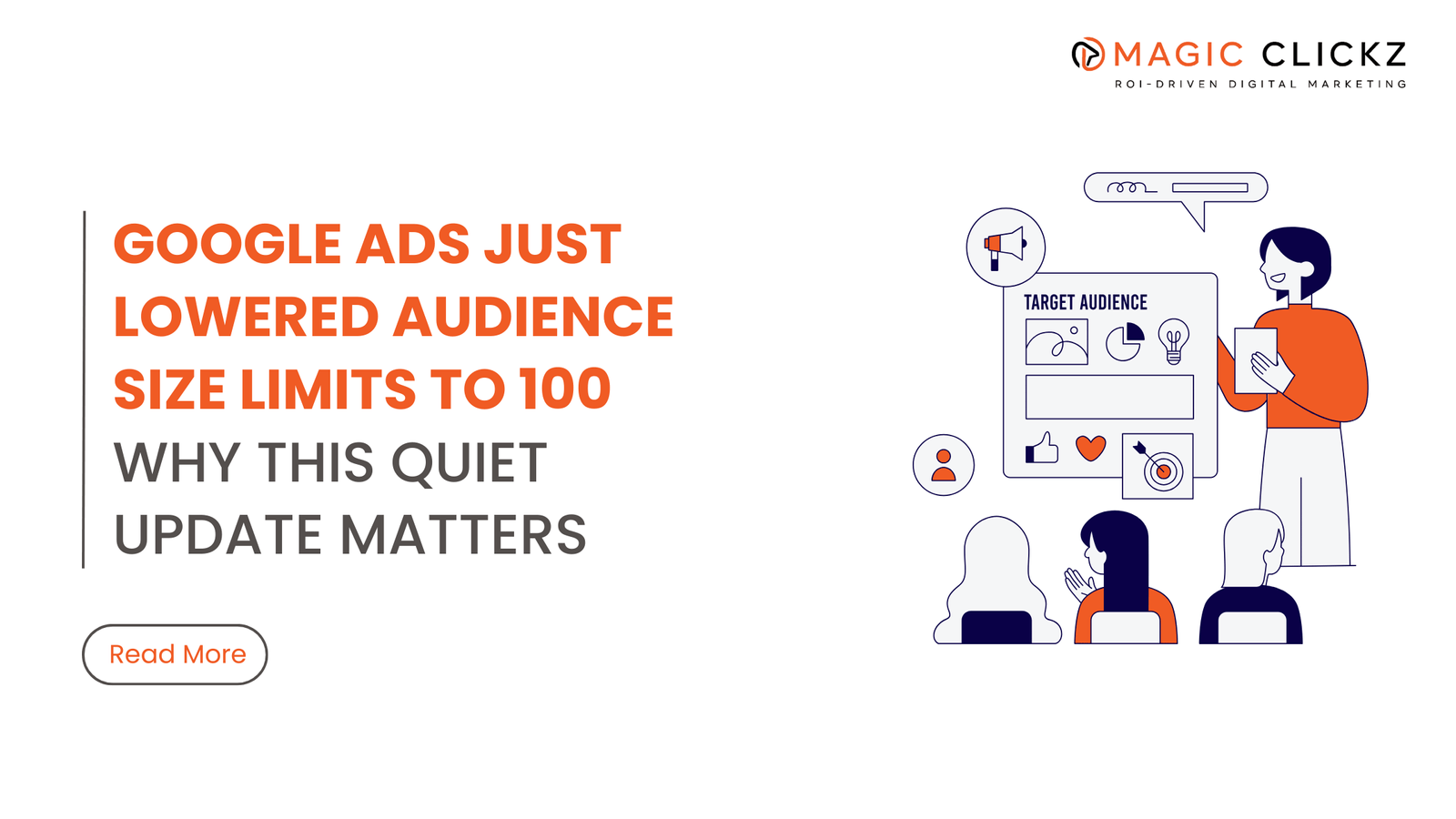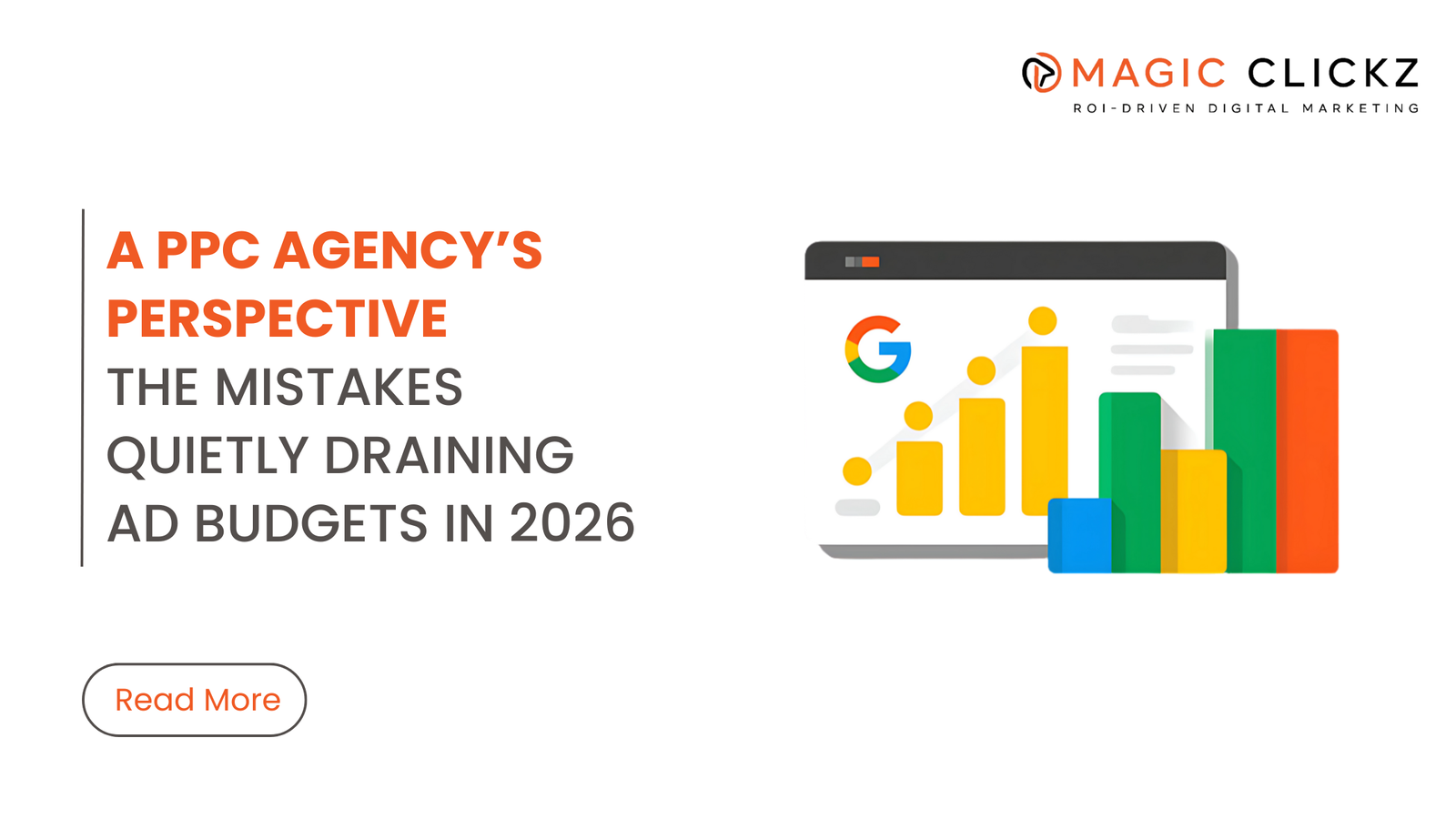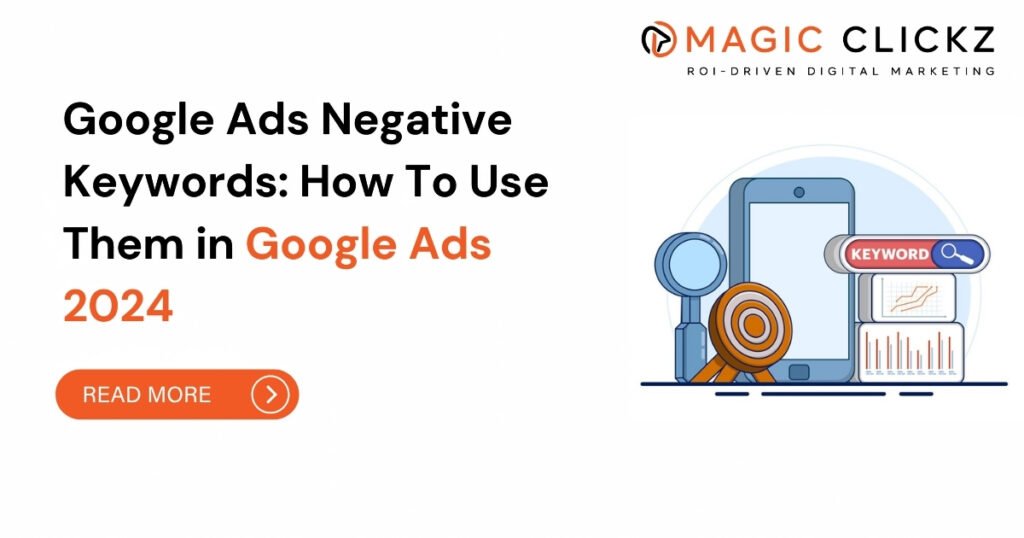
Google Ads is one of the most effective tools for driving traffic to your website, but success doesn’t just depend on targeting the right keywords. Equally important are Google Ads Negative Keywords. These are the terms you tell Google not to show your ads for, helping to filter out irrelevant traffic and ensuring your budget is spent on the most valuable clicks to your website.
In this blog, we will delve into the effective use of Google Ads Negative Keywords in 2024 to enhance your campaign performance. We will cover a comprehensive range of topics, including how to add negative keywords to your campaigns and the most effective strategies for using them. The best digital marketing agency will guide you through the process to ensure your campaigns reach their full potential.
Costly Clicks: Did you know that up to 76% of clicks on PPC ads can be wasted due to irrelevant searches? By implementing negative keywords, advertisers can save 15% to 20% on their PPC budgets by filtering out these costly clicks!
Table of Contents:
- What Are Negative Keywords?
- Why Are Negative Keywords So Important for Google Ads?
- Understanding Negative Keywords in Google Ads
- How Negative Keywords Can Help You Save Money
- How to Add Negative Keywords to Your Campaigns
- Best Strategies for Negative Keywords in 2024
- Why Negative Keywords Are a Game Changer
What Are Negative Keywords?
Google Ads Negative Keywords are search terms that prevent your ads from showing up for specific queries. By adding these negative keywords for PPC campaigns to your campaigns, you ensure that your ads are not triggered by irrelevant searches.
For example, if you’re a luxury shoe retailer, you wouldn’t want your ads showing for searches like “cheap shoes” or “free shoes.” By using Google Ads Negative Keywords, you can eliminate these unwanted clicks, helping you focus your ad spend on more relevant searches.
In simpler terms, negative keywords act like a filter for your campaign. Stopping your ads from showing for unrelated search terms that won’t convert. Implementing a negative keyword strategy is essential for improving your overall campaign performance.
Why Are Negative Keywords So Important for Google Ads?
The key to running a successful Google Ads campaign is getting the right kind of traffic. Irrelevant clicks not only waste your advertising budget but also harm your campaign’s performance. This is where Google Ads Negative Keywords come into play. Here’s why they’re essential:
- Reduce Wasted Ad Spend: Without Google Ads’ Negative Keywords, your ads might appear for irrelevant searches. Every click costs money and if users aren’t interested in what you’re offering, that money is wasted. Negative keywords help cut down on these unnecessary expenses.
- Improve Click-Through Rate (CTR): When your ad appears for the right audience, they’re more likely to click on it. Google Ads Negative Keywords ensure your ad is seen by people who are genuinely interested, which increases your CTR.
- Boost Quality Score: Google rewards ads with higher CTRs and better relevance by giving them a higher Quality Score. Using Google Ads Negative Keywords helps improve your Quality Score, lowering your cost per click (CPC) over time.
- Enhance Ad Relevance: Targeting the wrong audience with irrelevant ads can hurt your campaign performance. Negative keywords help keep your ad relevant by ensuring it appears for the right searches.
- Advanced Negative Keyword Techniques: Implementing advanced techniques, such as regularly updating your negative keyword list and utilising tools like the Keyword Planner, can significantly enhance your ad targeting and campaign efficiency.
Understanding Negative Keywords in Google Ads
Optimizing your Google Ads campaigns involves strategically using negative keywords. Here’s a fresh look at the three types of negative keywords and how they work:
1. Negative Broad Match
This setting is the default for negative keywords. With a negative broad match, your ads won’t show if the search includes all your specified negative terms in any order. However, your ad might still appear if only some of the terms are included.
Example:
Negative broad match keyword: outdoor furniture
| Search | Could an ad show? |
| garden decor | Yes |
| outdoor chair | Yes |
| patio outdoor furniture | No |
| furniture outdoor | No |
| outdoor furniture deals | No |
2. Negative Phrase Match
For negative phrase match keywords, your ad won’t show if the search includes the exact keyword terms in the same order. Additional words can be included, but as long as all the keyword terms appear in that sequence, your ad won’t display.
Example:
Negative phrase match keyword: “outdoor furniture”
| Search | Could an ad show? |
| garden decor | Yes |
| outdoor chair | Yes |
| best outdoor furniture | No |
| furniture for outdoor spaces | Yes |
| outdoor furniture | No |
3. Negative Exact Match
With negative exact match keywords, your ad won’t show if the search contains the exact keyword terms in the specified order without any additional words. Your ad can still appear if extra words are added.
Example:
Negative exact match keyword: [outdoor furniture]
| Search | Could an ad show? |
| garden decor | Yes |
| outdoor chair | Yes |
| affordable outdoor furniture | Yes |
| best outdoor furniture | Yes |
| outdoor furniture | No |
How Negative Keywords Can Help You Save Money?
Negative keywords for Google Ads are an essential tool for optimising your campaigns and reducing unnecessary ad spend. Here’s how negative keywords strategy can help you save money:
Avoiding Irrelevant Clicks
By implementing negative keywords for Google Ads campaigns, you prevent your ads from appearing in irrelevant searches. For example, if you sell luxury handbags, adding “cheap” as a negative keyword ensures your ad doesn’t show up for searches like “cheap handbags,” saving you from clicks that are unlikely to convert.
Improving Click Through Rate (CTR)
A well-crafted negative keywords strategy helps improve your click-through rate (CTR) by blocking irrelevant traffic. This not only boosts your CTR but also improves your Quality Score, which in turn lowers your cost per click (CPC), allowing your Google Ads campaign strategy to stretch your budget further.
Maximising Budget Efficiency
Using negative keywords in Google Ads ensures that your ad budget is spent on high-quality traffic. By filtering out irrelevant searches, you direct more of your budget towards users who are more likely to convert, leading to more efficient spending without increasing your ad spend.
Lowering Cost Per Acquisition (CPA)
An optimised Google Ads campaign strategy with a robust negative keywords guide helps lower your cost per acquisition (CPA). For instance, excluding traffic searching for “budget vacations” when promoting luxury travel services will significantly reduce non-converting clicks and improve your CPA.
Increasing Conversion Rate
When you use negative keywords in your digital marketing PPC campaigns, your ads reach a more relevant audience. This means you’ll likely see higher conversion rates because you’re targeting users who are genuinely interested in what you offer. Ultimately, this helps you achieve better returns on your investment (ROI).
Preventing Wasted Impressions
Another advantage of a solid negative keywords strategy is the prevention of wasted impressions. By ensuring that your ads don’t appear for irrelevant search terms, you maintain a high-quality Score and prevent ad fatigue, thereby keeping impressions meaningful and targeted.
Long-Term Cost Savings
Consistently refining your negative keywords list is crucial for long-term cost savings in any PPC advertising campaign. Regularly reviewing your search terms report helps you identify irrelevant queries that trigger your ads and adjust your Google Ads strategy accordingly, leading to optimised results over time.
Leveraging negative keywords for Google Ads campaigns is essential for improving efficiency and saving money. By avoiding irrelevant clicks, improving CTR, lowering CPA, and boosting conversion rates, negative keywords ensure your ad spend is focused on high-quality traffic, maximising your ROI and reducing wasted ad spend.
The Right Way to Choose Your Negative Keywords
How Your Negative Keywords Should Be
Using negative keywords is vital for optimising your Google Ads campaigns. They prevent your ads from appearing for irrelevant searches, saving you money and enhancing overall performance. Here’s how to ensure your negative keywords are effective:
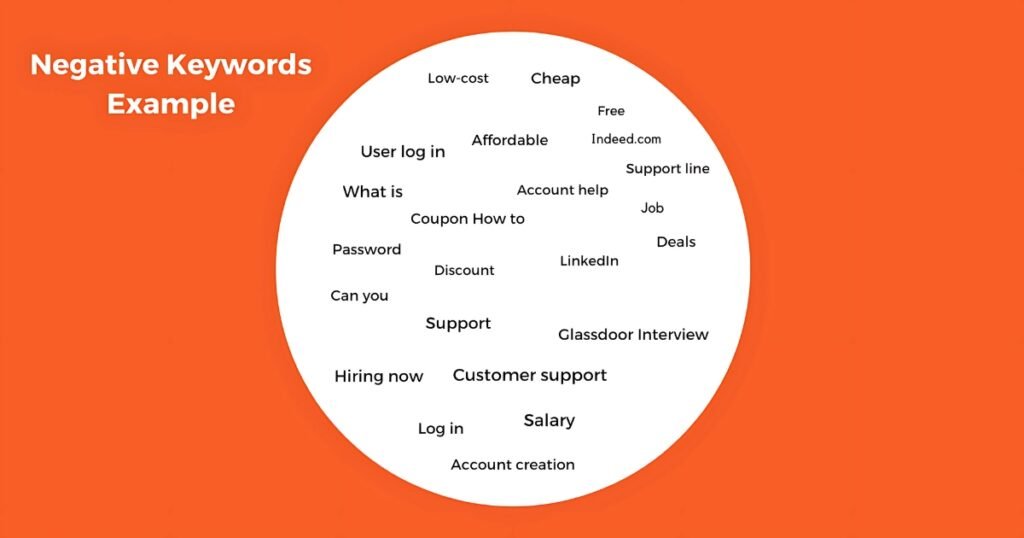
- Relevance: Choose negative keywords that are closely related to your business and offerings. For instance, if you sell premium skincare products, avoid keywords like “cheap” or “free” to filter out irrelevant traffic.

- Comprehensiveness: Regularly review and expand your negative keyword list. Think about variations and synonyms that potential customers might search for but are not applicable to your products. This can include PPC negative keywords that may lead to wasted clicks.
- Specificity: Be specific with your negative keywords. Instead of a broad term like “shoes,” use “free running shoes” to eliminate searches that do not align with your target audience.
- Match Types: Utilise different match types for your negative keywords (broad, phrase, or exact). This gives you control over how closely a search term must match your negative keyword before your ad is excluded. This is a crucial part of any advanced negative keyword strategy.
- Data-Driven Decisions: Regularly analyse your campaigns by reviewing the Search Terms Report. This helps you identify new negative keywords based on actual queries that triggered your ads but were irrelevant, enhancing your digital marketing strategies for 2024.
- Organisation: Keep your negative keywords well organised. Create lists specific to different campaigns or ad groups, making it easier to manage and update them as needed. This organisational strategy is essential for successful PPC campaigns.
Must-Have Negative Keywords for Your Campaigns
Here are 30 effective examples of negative keywords to consider adding to your list:
- Free
- Cheap
- Discount
- Best
- Used
- Secondhand
- DIY
- Wholesale
- Jobs
- Review
- Complaints
- Classes
- Tutorial
- Recipe
- Pictures
- Training
- Careers
- Tips
- Guide
- Internship
- Courses
- Sample
- Application
- Beginner
- Example
- Template
- Demo
- Support
- Hire
- How-to
By carefully managing your negative keywords, you can ensure your ads are shown to the right targeted audience, increasing your chances of conversions and improving your overall campaign performance.
How to Add Negative Keywords to Your Campaigns
Adding Google Ads Negative Keywords is crucial to ensure that your ads are not shown to irrelevant audiences. There are a few effective methods to add negative keywords to your campaigns and we’ll walk you through them step-by-step.
Using Google’s Keyword Planner
One way to add negative keywords is by using Google’s Keyword Planner during keyword research. As you gather keywords you want to target, you’ll also come across ones you don’t want your ads to appear for. These can be added as negative keywords to filter out irrelevant searches.
Here’s how to do it:
- As you’re compiling your list of keywords in the Keyword Planner, highlight the keywords you do not want by clicking the checkbox next to them.
- Click “More” in the blue header above and select “Add as negative keywords.” This action will automatically add these unwanted terms to your negative keyword list.
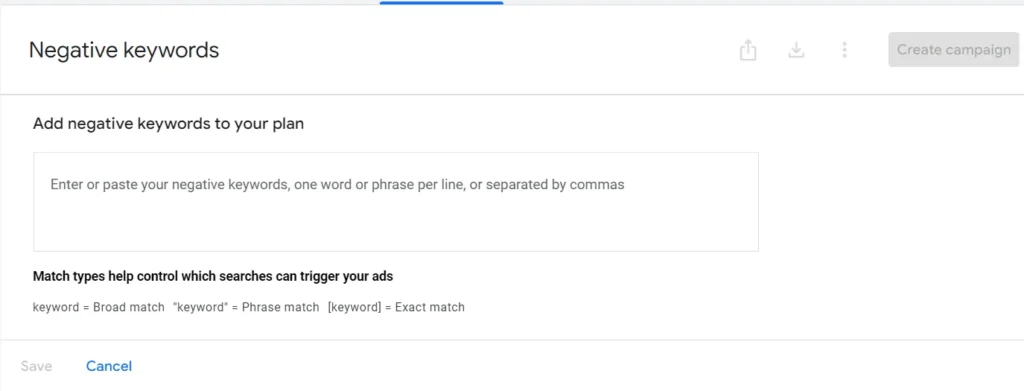
This helps ensure your ads are not triggered by searches that are irrelevant to your product or service, improving the overall efficiency of your campaign.
In the Google Ads Campaign Manager
You can also add negative keywords directly in the Google Ads Campaign Manager. This can be done at the campaign level or the ad group level, depending on how specific you want to be.
Steps to Add Negative Keywords:
- Log in to Google Ads and navigate to the campaign you want to edit.
- In the left-hand menu, click on “Keywords” and select “Negative keywords” from the drop-down list.
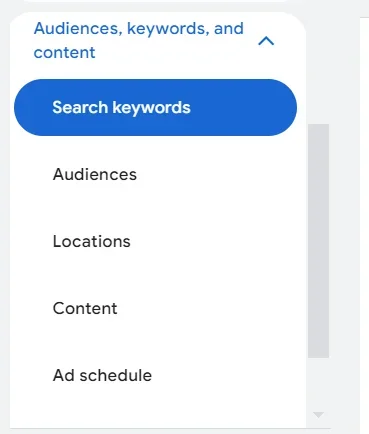
- To add new negative keywords, click on the blue “+” sign. You can then enter multiple negative keywords and set their match types (broad, phrase, or exact).
- You can also create a Negative Keyword List to easily apply the same set of negative keywords across multiple campaigns. This feature is a time saver, especially if you frequently run similar campaigns.
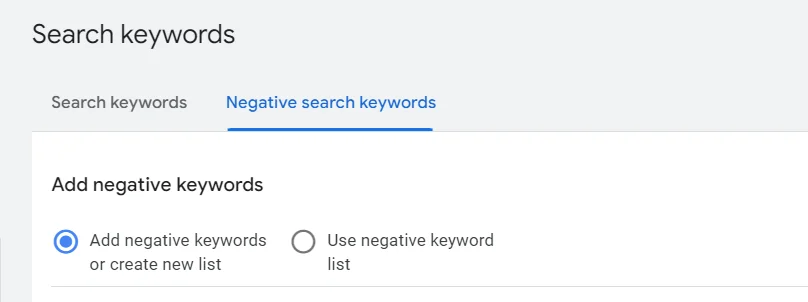
Don’t forget that you can update or edit the negative keyword list at any time, including changing the match types to fine-tune your targeting.
How to Find Negative Keywords for Your Campaigns
Identifying the right negative keywords is key to the success of your campaign. Here are a few methods to help you find them:
1. Through Keyword Research
During keyword research, you’ll likely encounter search terms that are not relevant to your ads. For example, if you’re running ads for a premium service, terms like “cheap,” “free,” or “discount” may appear in your keyword suggestions. These should be added to your negative keyword list to prevent your ads from showing for these irrelevant searches.
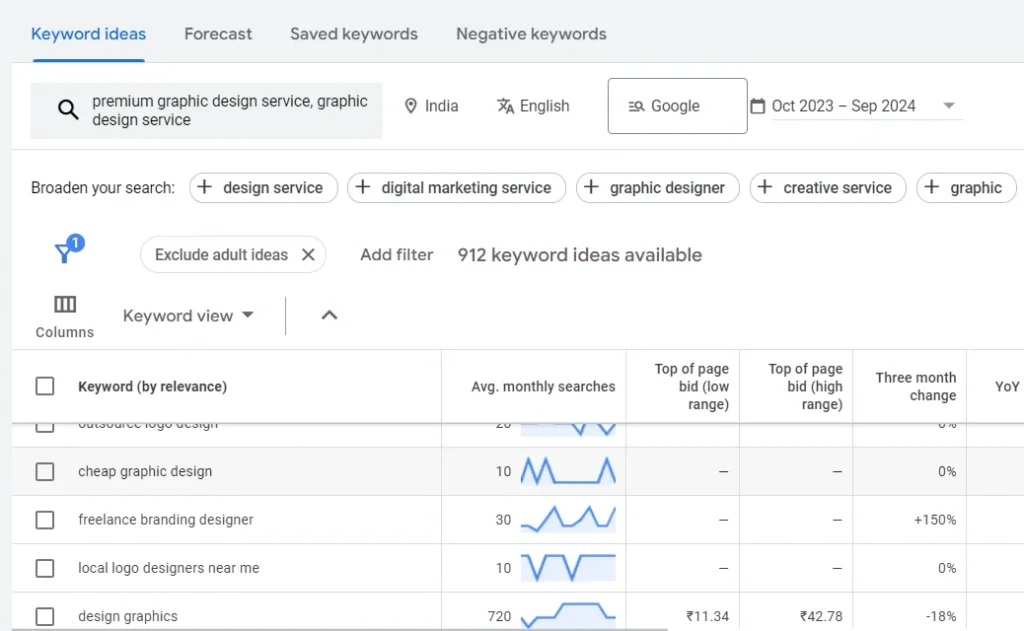
Use the Refine Keywords feature in the Keyword Planner to search for negative keywords. Simply check the categories of keywords you want to exclude and add them to your negative keyword list with a few clicks.
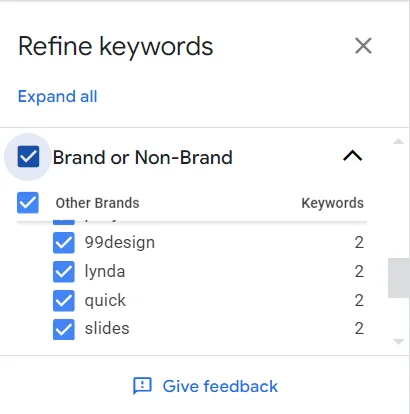
2. By Considering Search Intent
Understanding search intent is another vital aspect of identifying negative keywords. For instance, if you’re advertising for a specialised service like “luxury travel planning,” but keywords like “budget travel” appear in the search, it might be necessary to add “budget travel” as a negative keyword. This ensures that your ads are shown to a more relevant audience, focusing on searchers looking for premium travel experiences rather than low-cost options.
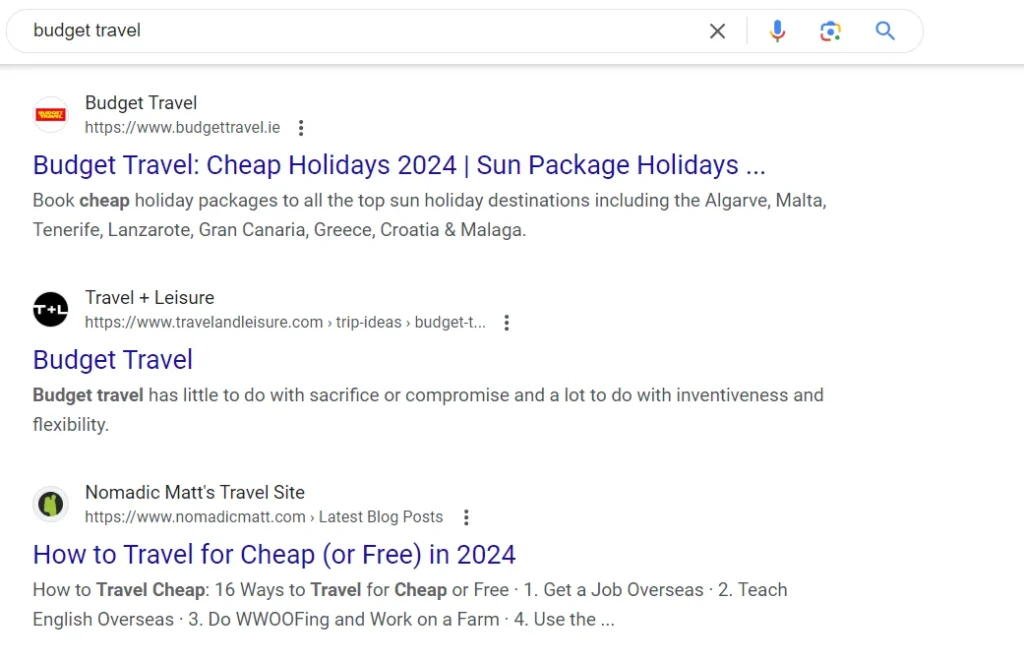
3. Using the Search Query Report
Review your Search Query Report regularly to identify low-performing or irrelevant keywords. This report shows you the actual search queries that triggered your ads. If you find non-relevant terms popping up frequently, add these to your negative keyword list.
The Limit of Negative Keywords to Involve in Google Ads Campaigns
Managing negative keywords is vital for optimizing your Google Ads campaigns. Here’s a quick overview of the limits:
- Campaign Level: Add up to 5,000 negative keywords per campaign to filter out irrelevant searches.
- Ad Group Level: Each ad group can also have 5,000 negative keywords, allowing for precise targeting.
- Account Level: Across your account, maintain a total of 10,000 negative keywords for comprehensive control.
Monitor and Adjust Negative Keywords
Once you have added your negative keywords, it’s essential to monitor and adjust them regularly. This helps ensure your campaign remains optimised over time. Regularly reviewing your Search Terms Report will help you identify any new irrelevant terms and prevent wasted ad spend. Additionally, consider adjusting your negative keywords based on seasonality or trends that may affect user behaviour.
Also, consider partnering with a digital marketing agency in Indore for Google Ads management to optimise your strategies further.
Best Strategies for Negative Keywords in 2024
In the dynamic landscape of digital marketing, leveraging PPC negative keyword strategies is essential for optimising your Google Ads campaigns. By effectively managing negative keywords, you can refine your targeting, ensuring your ads reach the right audience while avoiding irrelevant traffic. Here are some best practices to implement:
1. Regularly Update Your Negative Keyword List
Stay proactive by consistently reviewing and updating your negative keyword list. This ensures you’re filtering out the most irrelevant searches and adapting to changes in user behaviour.
2. Analyse Your Search Query Reports
Regularly dive into your search query reports to spot low-performing or irrelevant keywords. These insights allow you to continuously refine your strategies, enhancing your campaign’s effectiveness.
3. Focus on User Intent
Understanding user intent is crucial in identifying which keywords should be excluded. If your ad is for a premium service, ensure that terms like “cheap” or “discount” are part of your negative keyword list to avoid attracting the wrong audience.
4. Monitor Competitor Strategies
Keep an eye on your competitors and their ad strategies. Understanding what negative keywords they might be using can provide insights for your own campaigns.
By implementing these PPC negative keyword strategies, you can optimise your ad spend, enhance targeting accuracy and ultimately improve your return on investment (ROI) in 2024 and beyond. Stay ahead by continually refining your approach to negative keywords and aligning it with your overall digital marketing strategy.
Need More Help with Keywords? Let Magic Clickz Assist You!
Do you want to spend your hard-earned budget on irrelevant keywords that lead to wasted clicks and missed opportunities? Magic Clickz, the best digital marketing agency in Indore, is here to transform your Google Ads campaigns with expert negative keyword strategies and comprehensive keyword research.
Our dedicated team will work closely with you to identify the right keywords that drive meaningful traffic to your website.
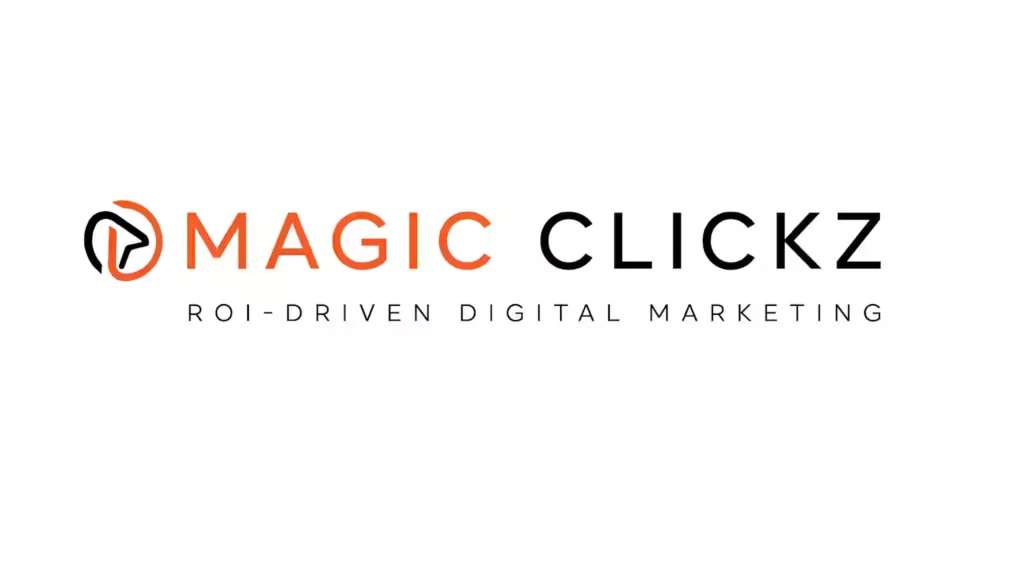
Don’t let inefficiencies hold your PPC campaigns back any longer. Partner with Magic Clickz, the best Google Ads agency, today and watch your ROI soar as we optimise your ad management to ensure that every dollar spent contributes to your success.
FAQs
What are negative keywords in Google Ads?
Negative keywords are specific terms that prevent your ads from appearing in searches that are not relevant to your products or services. Adding negative keywords lets you filter out unwanted traffic, ensuring that your Google Ads campaign is focused on attracting high-quality leads.
Why should I use a digital marketing agency for negative keyword management?
A digital marketing agency can provide expertise in managing negative keywords effectively, helping you to optimise your campaigns and reduce wasted ad spend. They can analyse data and trends to create a tailored strategy that ensures your ads reach the right audience.
How can negative keywords improve my Google Ads performance?
Implementing negative keywords helps improve your ad relevance, click-through rate (CTR) and overall campaign performance by ensuring your ads are shown to users who are more likely to convert. This leads to a more efficient use of your budget and higher returns on investment.
What is the best way to find negative keywords for my campaigns?
The best ways to find negative keywords include conducting keyword research using tools like Google’s Keyword Planner, analysing your Search Query Report and considering search intent. Working with a digital marketing agency can also provide valuable insights into identifying the most effective negative keywords for your campaigns.
How often should I update my negative keyword list?
It is recommended to review and update your negative keyword list regularly at least once a month. This helps ensure your campaigns remain optimised and relevant, especially as user behaviour and search trends change.
Can negative keywords help lower my cost per click (CPC)?
Yes! By using negative keywords to filter out irrelevant traffic, you can increase your click-through rate (CTR) and Quality Score, which can ultimately lower your cost per click (CPC) in Google Ads campaigns.
What types of negative keywords should I consider?
Consider using broad match negative keywords, phrase match negative keywords and exact match negative keywords based on your campaign’s needs. Each match type provides different levels of control over which search terms trigger your ads, enhancing your targeting strategy.
How can I measure the effectiveness of my negative keywords?
You can measure the effectiveness of your negative keywords by monitoring your campaign metrics such as click-through rate (CTR), conversion rate and overall ad spend. Analysing these metrics can help you determine if your negative keyword strategy is working effectively.
What are some common mistakes to avoid when using negative keywords?
Common mistakes include not regularly updating your negative keyword list, being too broad with your negative keywords and failing to consider variations of relevant terms. Partnering with a digital marketing agency can help you avoid these pitfalls and create a more effective strategy.
How can I get started with negative keyword management for my Google Ads?
Start by identifying potential negative keywords using keyword research tools and analysing your Search Query Report. You can also consult with a digital marketing agency to develop a comprehensive negative keyword strategy tailored to your specific business needs.















